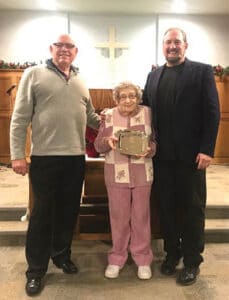Roxana Bravo, una madre y esposa ocupada, oriunda de Perú y residente en Estados Unidos desde hace 19 años, trabajó en las industrias del turismo y el cuidado infantil antes de encontrar una inesperada vocación como locutora cristiana.
La ruta de Bravo hasta Texas fue algo tortuosa después de conocer a su futuro esposo hace más de 25 años, cuando él estaba de visita en Perú. Aunque era reacia a dejar su país, siguió a su esposo a California y luego a Texas.
“Ahora, con el paso de los años, me doy cuenta de que era necesario salir de mi país para tener un verdadero encuentro con Cristo,” dijo Bravo.
Durante los últimos ocho años, junto a su familia, ha participado activamente en la Iglesia Bautista El Camino en Lewisville, donde Bravo está involucrada en los ministerios de alabanza y artes creativas y de mujeres. El pastor Félix Cornier llamó a Bravo un “gran activo para la iglesia y una bendición” que está “siempre dispuesta a ayudar.”
Su relación con Cristo, combinada con el ánimo de otros, la llevó a iniciar el programa “Caminando en Fe” en agosto de 2020, cuando las cosas fueron cerradas por COVID. Durante el programa de radio en vivo y por Internet, ella entrevista a líderes cristianos sobre asuntos de fe para ayudar a cambiar la vida de sus oyentes.
Cornier, un invitado frecuente, señaló que el programa tiene un amplio alcance. Recientemente, trató la ética cristiana en una emisión de noviembre. Otros temas son la doctrina, la política de la iglesia, la fe y la cultura.
P: ¿Cómo empezó Caminando de Fe?
RB: Comencé a hacer videos de 15 a 20 minutos sobre temas que empecé a compartir en la radio en agosto de 2020. En octubre, decidí ampliar el programa a una hora y mostrarlo simultáneamente tanto en la radio como en Facebook.
Los temas son de carácter cristiano, trato de elegir temas que muchas personas no se atreven a preguntar por miedo a ser juzgadas, o sobre los que aún no tienen respuestas muy claras. Nuestro enfoque es sencillo.
Doy gracias a Dios porque me ha dado personas [para entrevistar] llenas de sabiduría, pero sobre todo que están dispuestas y disponibles para ayudar e ir más allá compartiendo la palabra, obedeciendo así el mandato de nuestro Señor de ir por el mundo compartiendo las buenas noticias, haciendo discípulos y bautizándolos en el nombre del Padre, del Hijo y del Espíritu Santo.
Los programas son todos los sábados a las 8 (CST) de la mañana… así tendría más tiempo para aprovechar el día en actividades extra como el voluntariado.
P: ¿Quién escucha el programa?
RB: Espero en el Señor que los que escuchen sean aquellos que necesitan escuchar, que necesitan la oración o una palabra de aliento en la vida, que tienen sed de aprender y quieren aplicar lo aprendido. Siempre pido [la guía del Señor] porque no quisiera confundir más a un mundo que vive totalmente confundido e ignorante de la verdad.
Los oyentes se conectan desde Estados Unidos, Perú, México, Ecuador, Argentina, Puerto Rico, Canadá, Brasil, El Salvador y Nicaragua.
Quiero añadir que no es fácil hacer esto, que muchas veces me da un poco de miedo hacer el programa, sobre todo en la radio, ya que la estación de radio 94.7 no es cristiana sino una emisora secular. Acepté el reto de hacer el programa porque, aunque hay necesidades espirituales en el pueblo de Dios, ellos tienen la oportunidad de escuchar la palabra y elegir la obediencia. Los no creyentes no tienen la misma oportunidad. Con los no creyentes, los que decimos ser hijos de Dios debemos actuar, no con nuestras fuerzas ni con nuestra sabiduría, sino con la fuerza, la sabiduría y la gracia de Dios. ¿Cómo van a creer en aquel de quien no han oído? ¿Y cómo pueden oír sin un predicador (Rom 10:14)? Tenemos una gran responsabilidad.
P: Háblenos de su carrera en la radio.
RB: Todo comenzó de manera fortuita. A principios de 2020 una amiga muy querida y hermana en Cristo me propuso hacer un programa con ella. La idea no me pareció mala, pero no estaba segura de ser la persona adecuada, así que le dije que lo iba a pensar. Después de unas dos semanas, decidí ayudarla, pero como no le había dado una respuesta, ella ya había propuesto el proyecto a otra persona. Me alegré mucho porque sabía que lo haría muy bien.
Luego llegó la pandemia y con el cierre de las iglesias, me quedé pensando qué podía hacer para seguir en comunión con las hermanas, compartir devocionales o estudios bíblicos con las señoras con las que me reunía. Pensé en hacer video llamadas vía Zoom, pero no todas las señoras son muy diestras en la tecnología. Entonces me acordé de la radio, y a través de mi amiga pude contactar al dueño de la emisora. Le pedí sólo dos horas el segundo sábado de cada mes para hacer las transmisiones, pero me animó a hacerlas semanalmente. Yo estaba reacia, pero Dios me recordó los estudios bíblicos que había dirigido todos los viernes antes de la pandemia y eso me animó a hacerlo. El 2 de mayo de 2022, celebraré dos años con Radio PM 24.7.
P: ¿Cuándo comenzó a seguir a Cristo?
RB: Creo que siempre fui de Él, pero no lo sabía. A pesar de estar en una familia que pertenecía a la iglesia tradicional, nunca fuimos practicantes. Desde pequeños, estábamos rodeados de gente cristiana. Crecimos con el Club 700 y con dibujos animados como el Súper Libro. Incluso asistimos a un evento evangelístico en un estadio… en Perú. Nuestros padres nos criaron con una base moral muy sólida y en el temor de Dios, pero con el paso de los años, como todo adolescente, me fui alejando un poco y sin darme cuenta me volví atea.
Poco a poco me fui sumergiendo en la soledad y la depresión, pero el amor incondicional de Dios me salvó. Recuerdo que allá, a donde quiera siempre había alguien que me hablaba de Cristo. Un día que viajaba como azafata de tierra, atendiendo a un pasajero, me empezó a hablar de Cristo. Yo pensé: Bueno, ¿también aquí? Era increíble. Era como si Dios me buscara siempre y no pudiera esconderme de Él.
Recuerdo el día en que conocí a mi futuro esposo. ¡Resultó que era cristiano! No podía creerlo. No entendía lo que estaba pasando. Por un lado, decía que no creía en nada y por otro, muy escondido en mi corazón, necesitaba creer en alguien. Quería llenar mi vacío, ser libre porque me sentía prisionera en un mundo oscuro. Luego, conozco quien sería mi suegra y por respeto a ella, acepté al Señor como mi Salvador cuando tenía 19 años.
No fue hasta marzo de 2005 que tuve un verdadero encuentro con Cristo. Ese día no pude más y me rendí totalmente a sus pies. Ahí comenzó mi hermosa aventura con Cristo, una larga historia llena de altibajos como la de todos, de situaciones agradables y no tan agradables, pero con la total seguridad de que el Señor no me dejará sola. Su Palabra me dice que en este mundo tendré aflicciones, pero que tenga buen ánimo porque Él ha ganado y estará conmigo todos los días de mi vida.




























